您好,欢迎访问三七文档
1、1Period3 知识讲练课学习目标1.Grasptheusageofsuchimportantwordsandexpressionsasgreet,represent,association,curiously,approach,defence,major,likely,ingeneral,atease,loseface,turnone’sbackto,etc.2.Masterthefollowingpatterns:(1)ThefirstpersontoarrivewasTonyGarciafromColombia,closelyfollowedbyJuliaSmithfromBritain.(2)Notallculturesgreeteachotherthesameway,noraretheycomfortableinthesamewaywithtouchingordistancebetweenpeople.学习过程➡Step1 Fillintheblanksaccordingtowhatyouhavelearned.Yesterday,anotherstudentandI,(。
2、1) ouruniversity’sstudentassociation,wenttomeetthisyear’sinternationalstudents.Afterhalfanhourofwaiting,Isawseveralyoungpeopleenterthewaitingarealookingaround(2) .Iwentforwardto(3) them.Afterbeingintroduced,theygreetedeachotherindifferentways,causingsome(4) andculturalmistakes.AsIgettoknowmoreinternationalfriends,Ilearnmoreaboutthiscultural(5)“ ”.Notallculturesgreeteachotherthesameway,noraretheycomfortableinthesamewaywithtouchingordistancebetweenpeople.Inthesamewaythatpeople(6) withs。
3、pokenlanguage,theyalsoexpresstheirfeelingsthroughphysicaldistance,actionsor(7) .Theseactionsaresimplywaysinwhichcultureshavedeveloped.Ihaveseen,however,thatculturalcustomsforbodylanguageareverygeneral—notallmembersofaculture(8) inthesameway.(9),though,studyinginternationalcustomscancertainlyhelp(10) difficultiesintoday’sworldofculturalcrossroads.➡Step2 Wordsandexpressions1.Therearemanydifferentwaystogreetsomeoneusingwords.有许多利用语言和别人打招呼的方式。【观察思考】(1)Jimcameacrosstheroomtogreethisfriends.吉姆穿过。
4、房间来迎接他的朋友们。(2)Hegreetedmeinthestreetwithafriendlywaveofthehand.他在街上向我亲切地挥手致意。(3)Theyexchangedgreetingsandsatdowntolunch.他们互相致意后便坐下吃午饭。greetvi.&vt.迎接;问候greetsbwithsth用……欢迎/致意/问候某人greetsthwithsth对某事作出某种反应greetingsn.问候exchangegreetings互致问候【尝试运用】2(1)Hisspeechwas (欢呼)byloudcheers.(2)她以笑容迎接我。(汉译英)(3)Weexchange (问候)andgifts.2.Yesterday,anotherstudentandI,representingouruniversity’sstudentassociation...昨天,我和另一个学生代表我们学校的学生会……【观察思考1】(1)Thispaintingrepresentsastorm.这幅画描绘了一场暴风雨。(2)Youmustrepresentthedan。
5、gertothem.你必须告诉他们危险的所在。(3)Wechoseacommitteetorepresentus.我们选出一个委员会来代表我们。(4)Weappointedherasourrepresentative.我们指派她作为我们的代表。representvt.表现;描写;描绘;代表;声称represent...as把……描绘成……representsthtosb向某人陈述某事representoneselfas/tobe自称是representativeadj.有代表性的 n.代表;代理人representationn.表现;代表;代理【尝试运用】(1)He (声称)himselfasaphilosopher.(2)Thefirmneedsmore (代理)inChina.(3)Thismark (代表)avillage.【观察思考2】(1)Manyassociationsarebreakingupforlackofmoney.许多社团因缺乏资金而纷纷解散。(2)Ibenefitedmuchfrommyassociationwithhim.和他的交往让我受益匪浅。(。
6、3)Heassociatedpoliticswithwars.他把政治跟战争联系在一起。associationn.社团;联系;联想inassociationwith与……联合associatevt.将……联系起来;在头脑中联想associate...with...把……和……联系起来associatewithsb与某人常打交道【尝试运用】(4)We (一想起中国,就联想到了长城).(5)Don’t (与……打交道)dishonestboys.3.Isawseveralyoungpeopleenterthewaitingarealookingaroundcuriously.我看到几个年轻人进入候机室并且好奇地四处张望。【观察思考】(1)Iamcurioustoknowwhereshefoundthemoney.3我想知道她是在哪儿找到的钱。(2)Theywerecuriousaboutthepeoplelivingupstairs.他们对住在楼上的人感到好奇。(3)Outofcuriosity,hepulleddownthehandleofth。
7、efirealarm.出于好奇,他把火警警报器的手把拉了下来。curiousadj.好奇的;求知欲强的becurioustodosth好奇做某事becuriousabout对……好奇curiouslyadv.好奇地;感兴趣地curiosityn.好奇心;求知欲outofcuriosity出于好奇【尝试运用】(1)Shewas whathadhappened.她很想知道发生了什么。(2)Iwas howshewouldreact.我对她会怎样反应感到好奇。(3)Hegaveinto andopenedmyletter.他抵不住好奇心,拆开了我的信。(4)Iseehiseyes stareatme.我看到他的眼睛好奇地盯着我。4.TonyapproachedJulia,touchedhershoulderandkissedheronthecheek!托尼走近朱莉娅,摸了摸她的肩,亲了亲她的脸!【观察思考】(1)Thedayofhisweddingapproached.他结婚的日子临近了。(2)Weapproachedthemuseum.我们走近博物馆。
8、。(3)Hisworkisapproachingperfection.他的工作近乎完美。(4)Didheapproachyouaboutlendinghimsomemoney?他有没有向你接洽有关借钱给他的事?(5)Ourapproachfrightenedthebirdsaway.我们一靠近,鸟全都惊飞了。(6)WehavefoundanewapproachtothestudyofEnglish.我们发现了学英语的新方法。approachvi.&vt.向……靠近;接近;着手处理approachsbaboutsth接洽;要求approachn.靠近approachn.方法,步骤(后常跟介词to)【词汇辨析】approach,manner,way,method与meansapproach表示具体的做事的方法或手段,只和介词to搭配。manner“方式,样子,态度”,和介词in连用,如指“礼貌”,形式为复数,即manners。way“方式,方法”,和介词in连用。4method“方法,办法”,多指某种具体的方法,只和介词with连用。means“方法,手段”,和介词by连用。注意means。
9、的单数和复数形式相同。【尝试运用】(1)I’mgoingto (接洽)thebankaboutaloan.(2)The (临近)ofwinterbringscoldweather.(3)Whatisthebestway (处理)thisproblem?5.Shesteppedbackappearingsurprisedandputupherhands,asifindefence.她后退几步,显得很吃惊,并举起手来,好像在做防卫一样。【观察思考】(1)Shehadtodefendherselfagainsttheguarddog.她不得不防备看门狗咬她。(2)Theunionsaidthattheywouldtakeactiontodefendtheirmember’sjobs.工会说他们将采取行动维护会员的工作权益。(3)Athickovercoatisagooddefenceagainstcold.一件厚大衣足以御寒。(4)Theytookuparmsindefenceoftheircountry.他们拿起武器保卫祖国。defendvt.保卫,保护;捍卫,(为被告)辩护d。
10、efend...against/from...保卫……以免受……defendoneself自我防卫;为自己辩解defencen.防御;保卫,保护indefence防御,防卫indefenceof为了保卫……【尝试运用】(1)Helefthometojointhearmyto (保卫)hismotherland.(2)Theaccusedmanhadalawyertodefendhim.(英译汉)(3)Wouldyoubeableto (自卫)ifsomeoneattackedyouinthestreet?6.Iguessedthattherewasprobablyamajormisunderstanding.我猜想这其中可能有个大的误会。【观察思考】(1)Themajorpartofthejobisdonebymachine.这种工作主要由机器来做。(2)What’syourmajoratuniversity?你大学时的专业是什么?(3)ThemajoritywereonBen’sside.大多数人都站在本这一边。majoradj.主要的majorn.〔C〕专业;主修科目m。
 三七文档所有资源均是用户自行上传分享,仅供网友学习交流,未经上传用户书面授权,请勿作他用。
三七文档所有资源均是用户自行上传分享,仅供网友学习交流,未经上传用户书面授权,请勿作他用。
 234页
234页
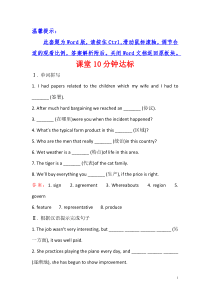 3页
3页
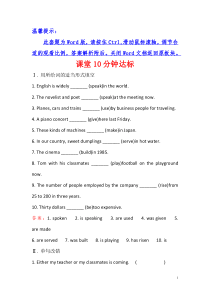 5页
5页
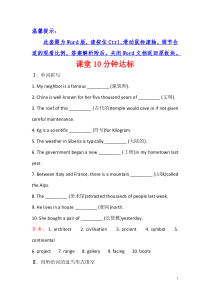 3页
3页
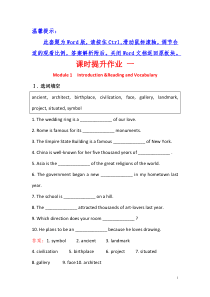 11页
11页
 3页
3页
 11页
11页
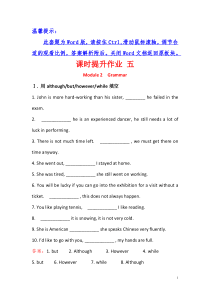 9页
9页
 10页
10页
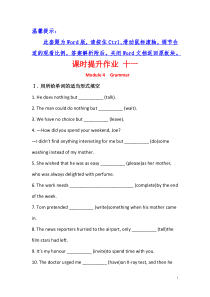 10页
10页
本文标题:2017-2018学年高中英语人教版必修四学案设计:Unit 4 Body Language 4.3
链接地址:https://www.777doc.com/doc-1943684 .html